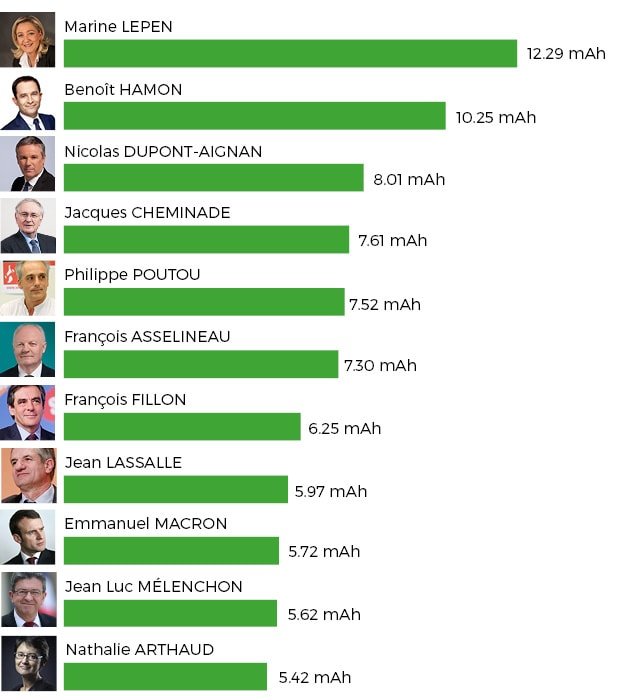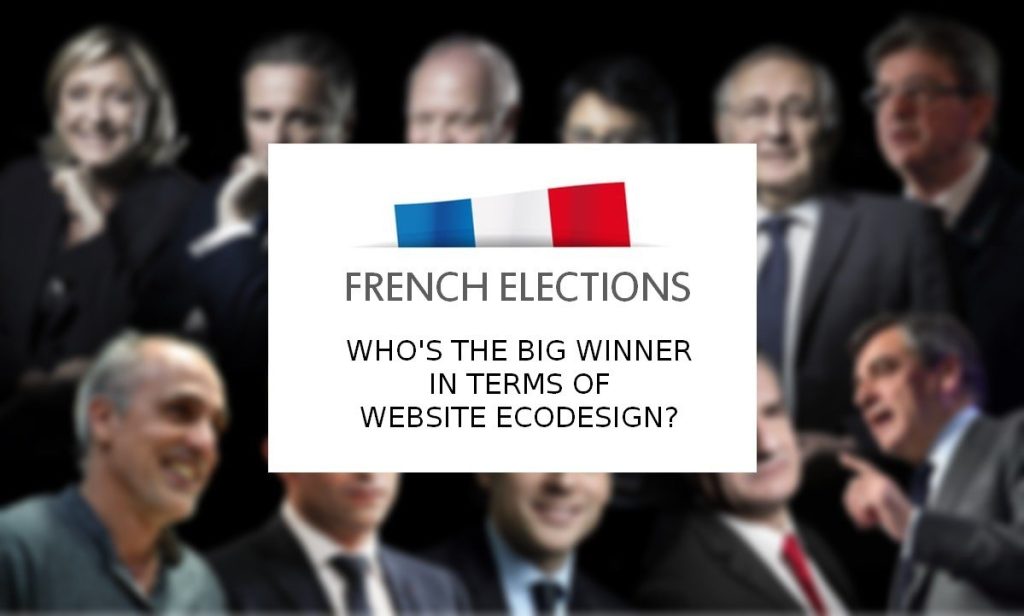First of all, let us precise that we are in no way telling you who to vote for. By using a hot topic in the news the aim is to sensitize a majority of people to numerical consumption and means to act on a media that is used more and more every single day, hence that has a growing impact on our world in terms of energy and resources consumption. First round of the French presidential elections is coming up this weekend so it was the right time for us to measure the energy consumption and impact on battery life of the 11 candidates’ websites..
Software like a website doesn’t wear out, nor get thrown away or plugged directly in the wall; indeed, with a high audience, it has an environmental impact: requests of smartphones, PC, networks or servers. More than just energy consumption on this numerical chain, the software is an obsolescence factor triggered on hardware, consuming services and contents less and less sober.
Even though presidential campaign websites are ephemeral, it is very interesting to measure their impacts on smartphones, in particular because of the high number of web-users (specifically mobile users). So the question is: are these websites eco-designed? And are they all energy efficient and sustainable? That’s what we tried to find out!
Methodology
We measured all 11 presidential candidates’ websites on a smartphone Nexus 6. Measures were executed with a battery charged between 50% and 80% (stable measuring range). Unnecessary functionalities (like Bluetooth, GPS, etc) were deactivated.
Measuring scenario with 4 automated and standardized actions:
- 1 reference measure: empty platform (phone measured without the application) which we will use to calculate a unit of functional autonomy d’autonomie.
Results
Here below is the comparison in terms of energy of the 11 candidates’ websites (mAh)

We notice that the 2 less energy-efficient websites are Marine Le Pen’s (12,29 mAh) and Benoît Hamon’s (10,25 mAh), whereas the 2 most efficient ones are Nathalie Arthaud’s (5,42 mAh) and Jean-Luc Mélenchon’s (5,62 mAh). The candidates’ websites represent an average energy consumption of 7,5 mAh.
We can also see an energy consumption differential of a factor of 130% between the most consuming and the less consuming ones, which is a pretty big difference for websites “playing” the same role.
If we make a projection of this scenario consumption, with the 4 actions played continuously, which is less-likely to happen – even if you are crazy obsessed with one of the candidates – we then get a difference in the amount of autonomy linked to the website that can go from 6 hours 50 to 2 hours 20.
Synthesis
The 11 candidates’ websites represent a very wide range of energy consumption on smartphones. The impact on battery life can vary by a factor 3. Even though these websites are ephemeral and will probably be taken down soon, but due to a potentially high number of visitors, it represents a rather important impact on mobiles and computers more generally.
However, this raises questions around specific users’ exclusion: if I don’t have access to a “decent” 4G connection, nor have an unlimited phone plan, nor have the means to charge my phone… Then loading will take longer and will have a greater impact on the overall behavior on my phone, its battery life, its display time…
This rather low level of eco-design is well-representative of the weak awareness of companies regarding sustainable and efficient digital practices. And this conclusion meets other evaluations, such as the accessibility of websites realized by the Valentin Haüy association.
Content rarely goes straight to the point (aka the program) and the expensive energy cost is also used for secondary needs like user profiling, videos, non-stop updates on social media… It is obvious that all candidates did transition to the digital world. Social media and tracking being must-have tools nowadays in order to promote a product or service and get a better visibility, transitioning the political world was much-needed.
However, except a handful of exceptions, we would have loved to see a better awareness in terms of digital sustainability and efficiency, more focused on the user… hence the voter!

